|
Old Park Works
In 1818 Lloyds,
Fosters & Company opened a coal mine near Hob’s Hole.
They were heirs of Richard Parkes, who in 1708 had
acquired a lease on the coal mines in the area. The coal
mine, like many others in the area suffered from
flooding, and so Samuel Lloyd installed a steam engine
to pump out the water. The site also contained large
quantities of iron ore, and also clay, which was used to
produce bricks and tiles.
The company
built an iron works and a foundry on the site, so that
the iron ore could be used to produce pig iron and
malleable iron for the foundry. All kinds of items were
cast including ironwork for buildings and bridges, parts
for steam engines, and wheels and axles for the
railways. Even complete locomotives were built. In 1849,
Old Park Works became the first factory in Staffordshire
to use the hot blast in their furnaces, which produced
high quality iron for the foundry.
|
|
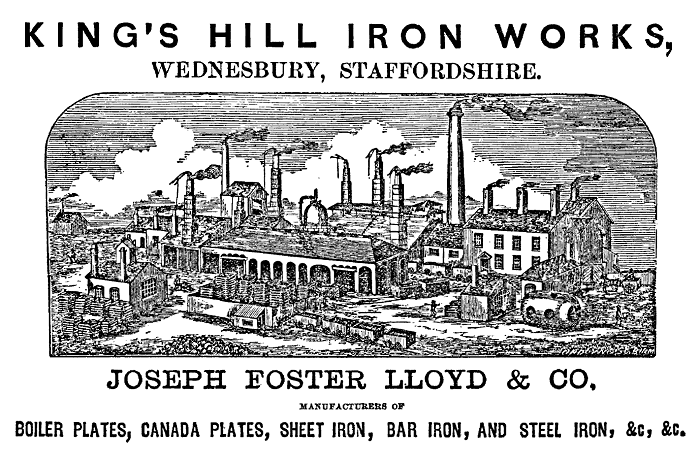
An advert from 1851. |
|
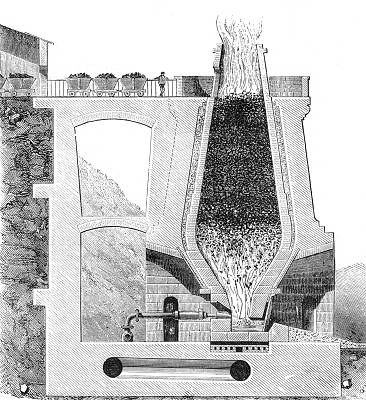
A cross section through a 19th
century blast furnace. |
Blast furnaces
originally used a cold blast, from air at normal
temperature. The cold blast cooled the furnace and so
large amounts of fuel were required to maintain the
temperature.
In the hot blast furnace the air was
pre-heated using the waste gases from the furnace which
greatly reduced the cooling effect and saved the company
around 10,000 tons of coal a year.
In 1854 the
company opened The Monway Axle and Tyre Works at Monway
Field. The new works produced axles, tyres, and iron
plate for boilers and bridges. |
| Samuel Lloyd was known as "Quaker
Lloyd" because of his religious beliefs. He was a good
employer whose kindness could be seen from the help that
he gave to widows and orphans of employees who lost
their lives in the company's collieries. He also built a
school where the orphans could be educated.
The company had a large truck shop
that sold only the best quality goods. Prices were low,
often lower than in the town centre shops. Samuel Lloyd
took great pride in buying the chief articles himself,
particularly tea, bullocks and sheep. The shop sold the
best butcher's meat in the town. Samuel Lloyd
died in 1862. Just before his death he signed an
agreement with Henry Bessemer for the use of the
Bessemer process, which the company began to use in
1865.
This was the first factory in the
Black Country to make mild steel, at a time when Old
Park Works were the largest steel works in the area,
employing over 3,000 people by 1866. There were 3 blast
furnaces, large machine shops, and foundries.
|
|
The company obtained a large order to supply the
ironwork for Blackfriars Bridge in London. Unfortunately
the building contractor was unable to pay for the
ironwork. As a large sum of money was at stake, Lloyds
and Fosters decided to finance the contractor until the
bridge could be completed. This soon led to the
company’s downfall because of unforeseen circumstances.
When work started on the bridge piers it took a long
time to find a suitable solid foundation, which greatly
increased the overall cost. As a result the company lost
£250,000 and in 1867 Old Park Works and Monway Works had to be sold to cover
the loss. The company was purchased by The Patent Shaft
& Axletree Company and became part of the largest steel
works in the area. |
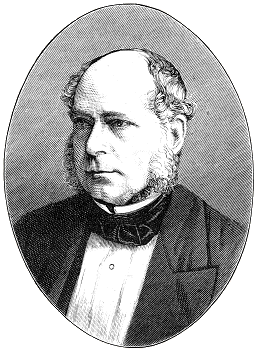
Henry Bessemer.
|
|
On the 18th April, 1902 the Patent
Shaft
& Axletree Company became part of the Metropolitan
Amalgamated Railway Carriage and Wagon Company Limited,
which was formed with a share capital of £1.5m to take
over the business of the Metropolitan Company and to
amalgamate with the following companies:
The Ashbury Railway Carriage and
Iron Company Limited, Brown and Marshall's Company
Limited, The Lancaster Railway Carriage and Wagon
Company Limited, The Willingsworth Iron Company Limited
and The Oldbury Railway Carriage and Wagon Company
Limited.
In 1912, Dudley Docker, the
company's Chairman, proposed changing the name of the
company from the Metropolitan Amalgamated Railway
Carriage and Wagon Company Limited to the Metropolitan
Carriage, Wagon and Finance Company Limited.
|
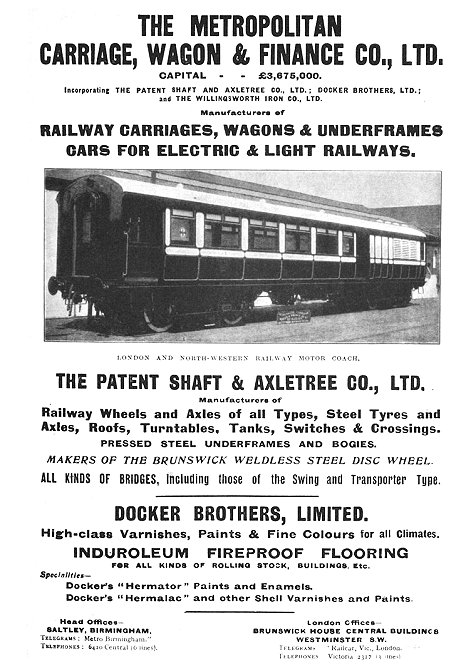
An advert from 1919.
|
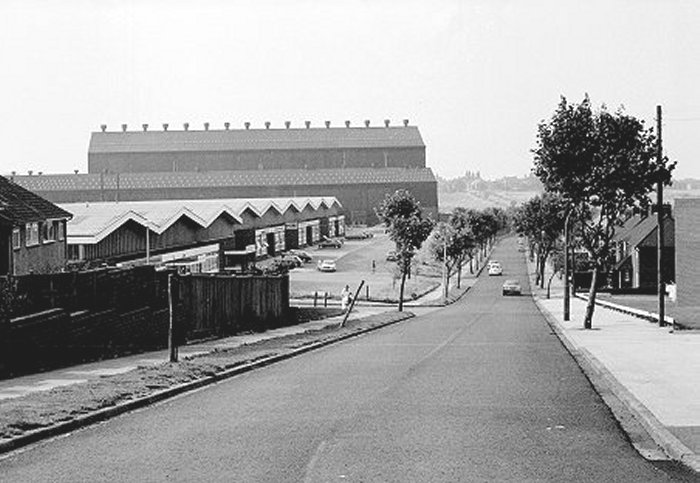
Old Park Works from Old Park Road.
|
| During the First World War, the company concentrated
on war work, and as a result made record profits. Some
of the first tanks were built at Old Park Works, which
at the time had between 1,300 and 1,500 employees. At
the end of the war, part of Old Park Works was used by
Vickers Limited of Sheffield, who in 1919 purchased the
Metropolitan Company. In 1929 Vickers Limited and
Cammell Laird & Company of Birkenhead, amalgamated their
steel making and carriage building businesses. This
resulted in the formation of the Metropolitan Cammell
Railway Carriage and Wagon Company. The take over had
one immediate effect at Wednesbury, the separation of
Old Park Works and the Patent Shaft. Vickers, who had
already been using part of Old Park Works took over the
remainder.
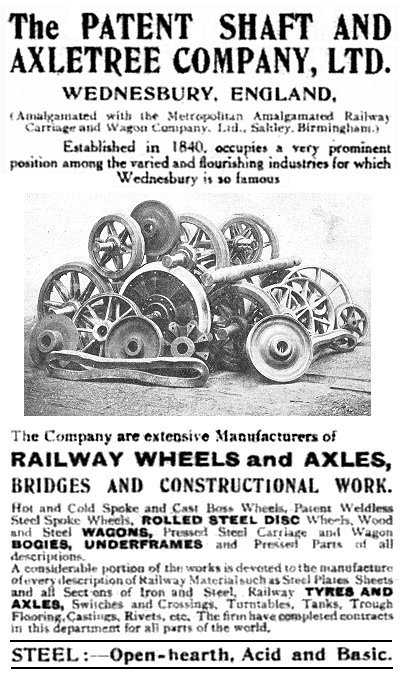
In 1938, war work began with a batch of forty five
A10 cruiser tanks. By 1942 Metropolitan Cammell was
producing 82 Valentine tanks a month, with production
equally divided between Old Park Works and the firm's
Midland Works. Over three and a half years, the firm
built 2,135 Valentines. During the war, 435 Churchill
tanks were built at Old Park Works, along with 75
Cromwell tanks, fitted with a 77mm high velocity gun.
Other war work included the production of armoured cars, artillery trailers, pre-fabricated hulls
for tugs and light tankers, and a small quantity of
railway rolling stock.
After the war, a train for the Royal Tour of South
Africa was built at Old Park Works.
In 1949 Old Park Works were sold outright to
Metropolitan Cammell to become part of the
Metropolitan Cammell Railway Carriage and Wagon Company
Limited, which also had factories at Elmdon, Saltley, and
Washwood Heath. |
|
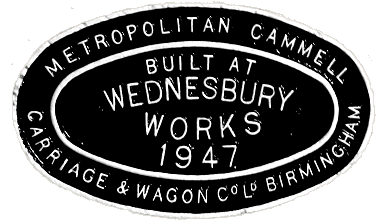
A wagon plate from 1947. |
The works now concentrated on the production of
railway coach bodies, railway wagons, and pressings of
all kinds for the other factories in the group. Old Park
Works also produced electric locomotives, and so a 65ft.
turntable and a test track was installed for the
purpose. In 1960 a total of 35 locomotives were sold to
South Africa.
In 1964 Old Park Works was acquired by the Owen
Organisation, but sadly closed as a result of the
recession in the 1970s and 1980s. |
 |
|
 |
|
 |
Return to The
Early Years |
|
Return to the
beginning |
|
Proceed to
Take Over |
|